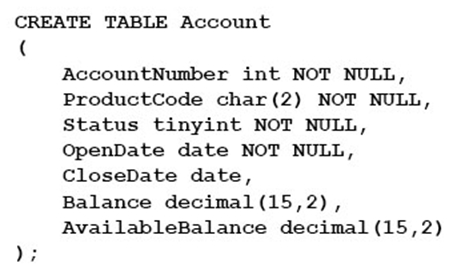

Note: This question is part of a series of questions that present the same scenario. Each question in the series contains a unique solution. Determine whether the solution meets the stated goals.
The Account table was created using the following Transact-SQL statement:
There are more than 1 billion records in the Account table. The Account Number column uniquely identifies each account. The ProductCode column has 100 different values. The values are evenly distributed in the table. Table statistics are refreshed and up to date.
You frequently run the following Transact-SQL SELECT statements:
You must avoid table scans when you run the queries.
You need to create one or more indexes for the table.
Solution: You run the following Transact-SQL statement:
Does the solution meet the goal?
MML
Highly Voted 4 years, 11 months agoHiken90
4 years, 11 months agoBarbedx
Most Recent 4 years, 5 months agoBarbedx
4 years, 5 months agoeggzamtaker
4 years, 5 months agoHA2020
4 years, 5 months agogeekeek1
4 years, 5 months agoCharlieBrownIsGreat
4 years, 7 months agoCharlieBrownIsGreat
4 years, 7 months agogiuPigna
4 years, 7 months agokiri2020
4 years, 7 months agoSoupDJ
4 years, 8 months agoAndy7622
4 years, 8 months agoHoglet
4 years, 6 months agoLukis92
4 years, 9 months agoLukis92
4 years, 9 months agodatabasejamdown
4 years, 8 months ago